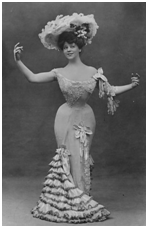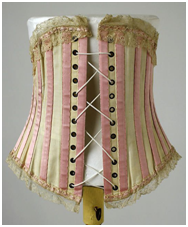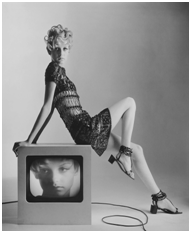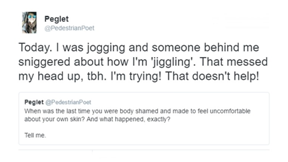Become Aware, Change Your Perceptions,
Reclaim Your Health & Happiness
Beauty has always been valued and sought after. But, worth based on weight and body image is a relatively new phenomenon. Advancements in conditioning and brainwashing, I mean marketing, has caused epidemic levels of this phenomenon. I’ve seen a distinct up-tick in the last 10 years of clients burdened with eating disorders, anxiety, and depression. A lot of that stems from constant campaigns showing unrealistic, outlier, or manipulated images of beauty. These issues are now prevalent and widespread. Enough so that the mainstream media is recognizing it and discussing it openly.
Beauty Weight and Worth – A History
Why is this happening? Spoiler alert, it’s the media. A bit of history can be very enlightening. If we go back to the early 1900’s the Gibson Girl was the height of fashion and femininity. They had a small waist and generous bust and hips. This was accomplished by using a corset. The corset of that time would likely be considered a torture device today. Beauty was being defined, but worth wasn’t associated with weight.


The roaring twenties gave way to the scandalous and irreverent flapper style. It was more androgynous, and emphasized a thin flat body, and short hair. This included special bras that would flatten the chest. Beauty was redefined, and the idea of weight tied to worth was first introduced. The 1930’s and 1940’s were tough times, with The Great Depression and World War II. The flapper was gone, and the media encouraged femininity and curvaceous body types. That continued through the 50’s and into the 60’s. Weight and worth were no longer associated together, and beauty continued to be defined in traditional ideals.
Peace Love and Anorexia
 Then came Twiggy. The start of models putting a hip and chic sheen to an underweight and unhealthy body. This trend has continued to this day, with ever increasing emphasis on thinness, fitness, and the addition of advanced plastic surgery procedures. What has this done for women? It’s created a lot of dissatisfaction with their bodies, and a lot of business for plastic surgeons.
Then came Twiggy. The start of models putting a hip and chic sheen to an underweight and unhealthy body. This trend has continued to this day, with ever increasing emphasis on thinness, fitness, and the addition of advanced plastic surgery procedures. What has this done for women? It’s created a lot of dissatisfaction with their bodies, and a lot of business for plastic surgeons.
It’s also created more anxiety, depression, and development of eating disorders. This media hyped obsession with maintaining a perfect body and appearance has also set its sights on men. They are now experiencing the same neurotic illnesses. The Binge Eating Disorder Association reports a four fold increase of men calling, compared to ten years ago. This is not the type of equality we want to see.
Brave New Depraved World
 The fashion and advertising industries didn’t stop there, and have set their sights on children. Children’s modeling and fashion are increasingly being sexualized. Why does the media do this? Like many things in this world it comes down to money. Marketers and fashion moguls have figured out that constantly presenting unrealistic images of beauty keeps people focused and spending on the external.
The fashion and advertising industries didn’t stop there, and have set their sights on children. Children’s modeling and fashion are increasingly being sexualized. Why does the media do this? Like many things in this world it comes down to money. Marketers and fashion moguls have figured out that constantly presenting unrealistic images of beauty keeps people focused and spending on the external.
The media objectification of the human body, mainly through ad campaigns, has long been used to pump up business. They’ve also figured out that snaring children will increase profits by manipulating them into this dysfunctional pursuit, and make them into vain superficial lifetime customers. Children should only worry about inner beauty, and their worth shouldn’t at all be tied to their weight. Being healthy and well adjusted are the primary concerns.
Beauty Weight and Worth – The Good The Bad and The Ugly
 Only 5% of women have model bodies. They are genetically tall, thin, broad-shouldered, narrow depth, long legs, and small breasted. This encourages the other 95% to engage in an endless cycle of fad dieting and trying questionable supplements. This rarely has long term success, and may actually damage your health.
Only 5% of women have model bodies. They are genetically tall, thin, broad-shouldered, narrow depth, long legs, and small breasted. This encourages the other 95% to engage in an endless cycle of fad dieting and trying questionable supplements. This rarely has long term success, and may actually damage your health.
I help clients assess the costs of attaining the thin ideal. Instead of happiness and contentment, the usual outcome is low self-esteem, financial drain, physical and mental exhaustion, health problems, depression, and anxiety. Weight remains a problem, worth is further damaged, and the focus on beauty is still external.
Reality vs Advertising
Research shows that up to 90% of females are dissatisfied with their bodies and want to lose weight. Psychologists at the University of Central Florida studied 121 girls ages 3-6. They had a specially trained “playmate” ask the girls how they felt about how they looked. 31% said they constantly worry about being fat. Another 18% expressed that they sometimes worry about it. That’s nearly 50% of preadolescent girls worried about their body image.
These statistics remain as age increases, and now includes boys. In high schools, 50% of females and 30% of males engage in early or full blown eating disorder behavior. Approximately 30 million US residents suffer from an eating disorder. Eating disorders have the highest mortality rate of all mental illnesses, with one death every minute. Females who have a chronic history of yo-yo dieting decrease their lifespan by 20%.
Your dissatisfaction is profitable, but not to you. According to a 2013 Yahoo! Shine report, women spend about $426 billion dollars a year on beauty products. CBS news reports Americans give up about $35 billion of their hard earned dollars per year on weight-loss products. Despite all that we continue to become a more obese society, and willing to engage in unhealthy behaviors and actions like restricting intake, laxative abuse, and invasive surgeries. Is this really all worth it to satisfy matching up to unrealistic manufactured images?
Beauty Weight and Worth – Escape The Trap
I’m not here to tell you to just let yourself go. It’s fine to enhance your appearance, and fantastic to be in good health. I do these things myself. Unfortunately American culture is obsessed with associating beauty and worth to weight and shape, and not about health. The healthy ideal is nowhere near the thin ideal.
 It’s healthy to have muscles and some body fat. With a healthy ideal the goal is health, fitness, and longevity. Not strictly body size and weight. The trap is allowing your health consciousness to be ruled by external influences. It’s critical to become and stay aware of the subtle, and not so subtle external influences on our self image.
It’s healthy to have muscles and some body fat. With a healthy ideal the goal is health, fitness, and longevity. Not strictly body size and weight. The trap is allowing your health consciousness to be ruled by external influences. It’s critical to become and stay aware of the subtle, and not so subtle external influences on our self image.
A newer and very powerful influence is social media. This is pervasive on our favorite social apps, and more damaging. It’s the impact of the words of real people, instead of an obvious advertisement. The results confirm that the culprit is the relationship between all of mass media messages, and the internalization of negative body image in women.
Take The Red Pill
After maintaining awareness, you need to stop comparing. I can’t stress this enough! Put down the burdens of judgment, comparison, and shame. Body confidence comes from accepting what you cannot change and celebrating who you truly are. Begin a relationship with yourself that is built on self-love and trust. Understand that there are always differences in body types. Self-worth is not based on a manufactured standard of appearance. It’s based on living in a reality that is relaxed, forgiving, flexible, comfortable, and accepting.
Respect genetic diversity of body weight and shape. Give yourself permission to relax in the body you were given, because it feels good and normal. Your body knows what’s best for you. This will empower you with energy, confidence, and radiance. That is what is truly attractive, and significantly better for mental and physical health.
Good mental health, and avoiding Eating Disorders, includes body positivity acceptance. I have clients who assume that something is wrong with their body if they don’t fit into size 0 jeans, or not losing weight every week. Approach your overall health as a combination of mind, body, and spirit. Give gratitude and appreciation for your body. Having a healthy body mind relationship is grounded in strength and positively reinforcing your self image.
It’s grounded in accepting that things change dependent on the time of the month, the fit of our clothing, how tired we are, our mood states, etc. Don’t be ruled by these things, because they’re temporary and changing. Sirona Therapy focuses on developing a strong sense of identity based on the inner qualities, rather than outward appearance. Our hope and desire is that you do the same.
If you would like more information about our programs, or need help:
Call: (914) 241-0727 Tap Number on Mobile to Call Now
Email: inquiries@sironatherapies.com.

Jennifer L. Zauner, LCSWR
Clinical Director
| If You Like Our Content, Please Share and Click The Heart Below | |||
|---|---|---|---|

